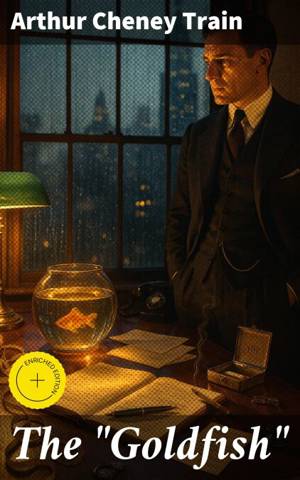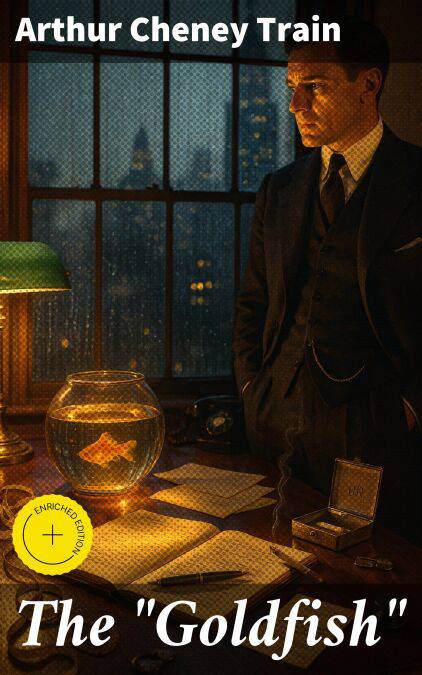
Bedankt voor het vertrouwen het afgelopen jaar! Om jou te bedanken bieden we GRATIS verzending (in België) aan op alles gedurende de hele maand januari.
- Afhalen na 1 uur in een winkel met voorraad
- In januari gratis thuislevering in België
- Ruim aanbod met 7 miljoen producten
Bedankt voor het vertrouwen het afgelopen jaar! Om jou te bedanken bieden we GRATIS verzending (in België) aan op alles gedurende de hele maand januari.
- Afhalen na 1 uur in een winkel met voorraad
- In januari gratis thuislevering in België
- Ruim aanbod met 7 miljoen producten
Zoeken
The "Goldfish" E-BOOK
Enriched edition. Being the Confessions af a Successful Man
Arthur Cheney Train
E-book | Engels
€ 0,49
Omschrijving
In "The Goldfish," Arthur Cheney Train crafts a compelling narrative that deftly interweaves elements of mystery and social commentary, capturing the intricacies of urban life in early 20th-century America. The novel revolves around the complex relationships individuals forge amidst societal expectations and the relentless pursuit of materialistic dreams. Train's prose is characterized by a keen observation of human nature, employing vivid imagery and a conversational tone that makes the societal critiques resonate powerfully with readers. The literary context of this work reflects the era's burgeoning fascination with psychoanalysis and the moral dilemmas posed by rapid industrialization, positioning it as a significant contribution to American literature during its time. Arthur Cheney Train was an accomplished lawyer and a prolific author whose diverse experiences in the legal field undoubtedly influenced his writing. Trained in both the intricacies of law and the nuances of human behavior, Train's background informs the psychological depth and moral ambiguities of his characters. His commitment to exploring societal issues is evident in this work, as Train employs fiction not only to entertain but also to provoke thought about the ethical dimensions of American life and the ever-elusive pursuit of happiness. I highly recommend "The Goldfish" to readers seeking an engrossing narrative that combines mystery with a profound exploration of societal values. Train's unique blend of legal insight and literary skill ensures that this book remains relevant today, challenging readers to reflect on the complexities of desire and morality in their own lives. This novel is a treasure trove of insight, appealing to both fans of classic literature and those interested in the sociocultural dynamics of a bygone era.
In this enriched edition, we have carefully created added value for your reading experience:
- A succinct Introduction situates the work's timeless appeal and themes.
- The Synopsis outlines the central plot, highlighting key developments without spoiling critical twists.
- A detailed Historical Context immerses you in the era's events and influences that shaped the writing.
- A thorough Analysis dissects symbols, motifs, and character arcs to unearth underlying meanings.
- Reflection questions prompt you to engage personally with the work's messages, connecting them to modern life.
- Hand‐picked Memorable Quotes shine a spotlight on moments of literary brilliance.
- Interactive footnotes clarify unusual references, historical allusions, and archaic phrases for an effortless, more informed read.
In this enriched edition, we have carefully created added value for your reading experience:
- A succinct Introduction situates the work's timeless appeal and themes.
- The Synopsis outlines the central plot, highlighting key developments without spoiling critical twists.
- A detailed Historical Context immerses you in the era's events and influences that shaped the writing.
- A thorough Analysis dissects symbols, motifs, and character arcs to unearth underlying meanings.
- Reflection questions prompt you to engage personally with the work's messages, connecting them to modern life.
- Hand‐picked Memorable Quotes shine a spotlight on moments of literary brilliance.
- Interactive footnotes clarify unusual references, historical allusions, and archaic phrases for an effortless, more informed read.
Specificaties
Betrokkenen
- Auteur(s):
- Uitgeverij:
Inhoud
- Aantal bladzijden:
- 231
- Taal:
- Engels
Eigenschappen
- Productcode (EAN):
- 4057664570864
- Verschijningsdatum:
- 4/12/2019
- Uitvoering:
- E-book
- Beveiligd met:
- Digital watermarking
- Formaat:
- ePub

Alleen bij Standaard Boekhandel
Beoordelingen
We publiceren alleen reviews die voldoen aan de voorwaarden voor reviews. Bekijk onze voorwaarden voor reviews.









